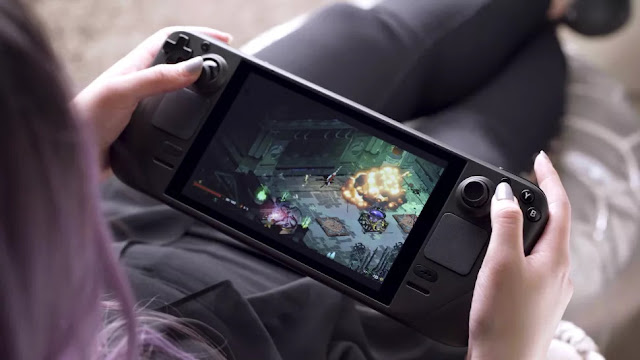Where Steam Deck Learns From Steam Machine
Last week Valve announced Steam Deck, a handheld PC with a starter price of $399 and going up to $650 for the highest end model. Automatically people compared it to other Valve hardware, namely the Steam Machine; Valve's attempt at the console market in 2015 that failed miserably. However, I disagree with people making this comparison; in fact I think Steam Deck stands a far better chance than Steam Machine did. But in order to understand why I need to explain why Steam Machine failed in the first place and where the Deck seems to learn from it.
The Steam Machine was released in 2015 as an attempt to go up against the PS4 and Xbox One while offering an entry into the PC market for non-PC gamers. This was where the problem began, no one knew is this was meant as just a prebuilt PC or a whole new console. And because Valve took the 3DO route of licensing the brand no one knew if you could even upgrade a Steam Machine. It was a very muddled system with an unclear role in a market where you need to be clear and concise.
This lead Steam Machine appealing to absolutely no one; it was either a slightly more expensive console without exclusives or a PC with no upgrade option. If people wanted a PC to play games they'd build or buy a PC; if people wanted the ease of a console they'd buy a console, which would also have exclusives unavailable on PC. This middle of the road approach and inconsistent standard appealed to no one and is the key factor in the Steam Machine dying.
The Steam Deck doesn't have this problem, there's no confusion about the Deck's role and there seems to be consistent standardization due to being designed in house by Valve. This results in the only thing the consumer having to worry about is in terms of choice is what tier you buy it at, which affects your storage capacity. It's simple and easy to understand for anyone interested, just like a console or a Switch. Of course while this is a major reason why the Deck is better than the Steam Machine it's not the only improvement.
Another problem with the Steam Machine was that the Xbox One and Playstation 4 were still hot and new at the time. Going at Sony and MS with similar specs but with no premium exclusives was a fools gambit. Sure there will always be great indie games on PC but there's nothing like Infamous, Halo, and Uncharted; the marquee titles that draw people in. If a hot new Valve title had launched at the same time as the Steam Machine that might have boosted sales but people might have just built or bought a PC instead due to the aforementioned inconsistent marketing.
Steam Deck meanwhile still doesn't have any exclusives; which sounds like a fools gambit compared to Nintendo. However the Steam Deck is far more powerful; it's basically a less powerful Xbox Series S. Which sounds unimpressive compared to newer gen hardware but blows the Switch out of the water. And given the Deck runs at 800p compared to the Series S' 1440p that power loss versus the Series S will be felt far less than one might think thanks to pixel density and screen size.
Of course none of that matters without good software choice in general, which was a problem with the Steam Machine. The Machine ran a version of Linux called SteamOS which the Steam Deck is set to run a 3.0 version of. The problem in 2015 was that the Steam Machine came out in an era with limited Windows compatibility for Linux, massively hobbling the device due to limited game selection.
However Valve worked on this afterwards though with Proton, a Windows compatibility layer for Linux. As a result almost a large amount of Windows titles can be played on Steam Deck, 15,000 out of 19,000 tested.
The only major problem facing Steam Deck in terms of software is anti-cheat which hates Proton like Proton stole it's wife. But Valve claims to be working on the issue with anti-cheat and given how important anti-cheat is for multiplayer gaming I have to believe them. Simply because without anti-cheat solutions Valve would be locking out a major component of the gaming market. Worse case scenario, you can just install Windows on the Deck given it's software is unlocked, but that is a massive pain in the neck that you shouldn't have to do.
But even this setback with anti-cheat is but a stumbling stone, a significant one mind you, but still only a stumble. The deck is not nearly as stacked against the Steam Deck as it was the Steam Machine, Valve only has one true competitor in Nintendo, the rest in the handheld PC market cost far more than even a Premium Model Steam Deck. Only time will tell, but I am cautiously optimistic for this device. That said I am going to wait for the reviews, which will make or break the Deck.





Comments
Post a Comment